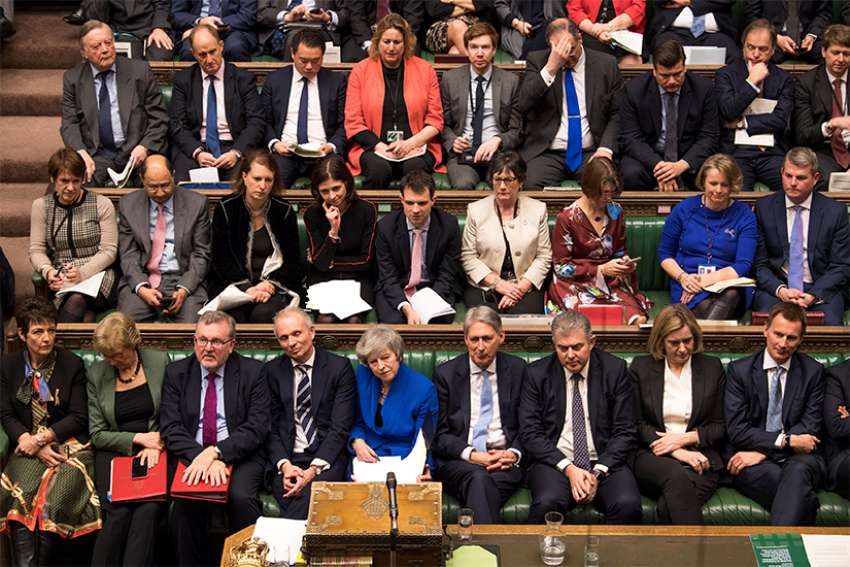It appears a crisis could be looming over the 500-kilometre border between Northern Ireland and the Republic of Ireland. At present, the border is wide open.
Three years ago, when we drove from Dublin to Belfast, we didn’t even know when we left one country and entered the other until I started to slow the car down and others on the highway began honking. That’s because the posted speed limits changed from “100” in the South to “60” in the North. I mistakenly thought the speed limit was reduced but it was changed, without saying, from metric to imperial.
It wasn’t long ago — during “The Troubles” from 1968 to 1998 — when the border was far from open. Many of the 270 public roads crossing the border were blocked by the British Army with obstacles or they looked like the cratered surface of the moon to prevent vehicular access. Armed guards were at other border points.
The Troubles were the fiercest guerrilla conflict in western Europe since the Second World War. Some 3,600 people died in the conflict, including dozens and dozens of children.
The 1998 Good Friday Agreement finally brought peace. It was a hard-fought compromise where those who saw themselves as Irish (mostly, but not exclusively, Catholics) and those who saw themselves as British (mostly, but not exclusively, Protestants) could live peacefully in the same place.
Prosperity followed as tensions were muted, or at least pushed below the public surface, between the two sides — Republicans or Nationalists and Unionists or Loyalists. Today, 30,000 people cross between the two countries every day.
And now Brexit.
Northern Ireland, created 100 years ago after civil war and part of the United Kingdom, is being forced to leave the European Union despite voting 56 per cent to stay in the June 2016 referendum. The Republic of Ireland remains in the EU; meaning the customs union and the single market will soon have a large unguarded hole in it.
The point of the EU is to allow members to send and receive goods across borders without customs checks and tariffs. Therefore, something needs to be done about the Irish border with one side in the EU and one side not.
Various ideas have been tossed about, from utilizing high-tech sensors and cameras to monitor what crosses the Irish border to a “hard border.” So far, no solution has been found.
“If you put up customs posts along the Irish border, people will shoot at them. There is no doubt about that,” Eamonn McCann, a Derry-based politician and author about The Troubles, told the CBC recently.
One thing is certain. British Prime Minister Theresa May’s “backstop” solution has been rejected.
Her backstop sought to avoid a hard border of barriers and physical checks by allowing Northern Ireland and its 1.9 million residents to stay in the EU. But the UK Parliament flatly turned that down in January because Britain would, in effect, remain beholden to the EU for an indefinite time period.
So, with only days to go until Brexit begins, and if a new arrangement isn’t found, a hard border could be going up almost overnight, according to British and EU pundits.
But every silver lining has a cloud so perhaps some Irish good could eventually come from Brexit. Could it lead to a united Ireland?
Protestants still outnumber Catholics in Northern Ireland, but demographics show the Protestant community is older and Catholics could outnumber them very soon, perhaps within three to five years. For example, Catholics make up 51 per cent of school children compared to Protestants at 37 per cent.
Again, that’s not to say all Catholics are Nationalists and all Protestants are Unionists, but things skew that way. And it’s not to say the 15-20 per cent of Northern Irish of different religion or no religion would all lean Nationalist or Unionist, either.
But the Good Friday Agreement opens the door to unity. In it, the Republic of Ireland’s government removed the articles of its constitution claiming sovereignty over Northern Ireland in exchange for a “binding obligation” by both itself and the British Government to negotiate a united Ireland if a majority of the people of Northern Ireland want to be part of the Republic.
Instead of a hard border and possible violence, could Brexit lead to a vote in Northern Ireland on whether to join the Republic? With its history of violence and mistrust on both sides, who knows?
Hopefully, the two decades of prosperity and peace have taught the two communities that bloodshed is not the answer. But, as the Irish say, you never miss the water until the well is dry.
(Brehl is a writer and author of many books.)
Support The Catholic Register
Unlike many other news websites, The Catholic Register has never charged readers for access to the news and information on our site. We want to keep our award-winning journalism as widely available as possible. But we need your help.
For more than 125 years, The Register has been a trusted source of faith based journalism. By making even a small donation you help ensure our future as an important voice in the Catholic Church. If you support the mission of Catholic journalism, please donate today. Thank you.


